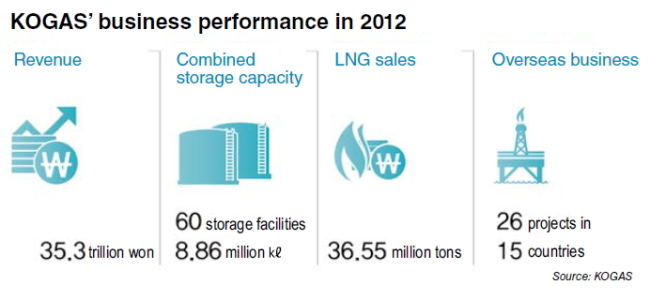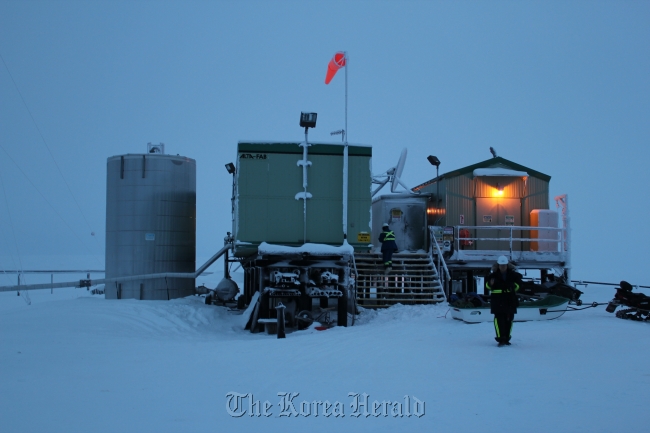This is the fourth in a series of case studies on the nation’s leading state-run companies which have made success stories overseas. ― Ed.
KOGAS, which has imported LNG and supplied imported gas to local power companies since its foundation in 1983, last Thursday hosted a groundbreaking ceremony in Maputo, capital of Mozambique, in southeast Africa for its new overseas business project.
Under the project, KOGAS will construct a 59-kilometer gas pipeline by October this year in Maputo and distribute 100,000 tons of LNG gas per year to power plants and industrial sites in the African capital city from 2014 to 2033.
A joint venture firm, established through a partnership between ENH in Mozambique and KOGAS last year, runs the city gas business project in Maputo. KOGAS has a 70 percent share in the company.
“It is the first time for KOGAS to enter the city gas business overseas. Based on experiences in Korean cities and Maputo, KOGAS will expand the city gas business to other cities overseas as a new income source,” a KOGAS official said.

Strategy for overseas business expansion
KOGAS’ core business has been LNG imports and supplying them to power plants and regional city gas companies, which supply gas to end users countrywide. LNG is the third-biggest power generation source in Korea, creating 25 percent of the nation’s total electricity generated after coal and nuclear power in 2012.
With local demand entering the mature stage and limits in price hikes due to the government’s control, KOGAS stepped up overseas business expansion for its sustainable growth from the 2000s.
 |
KOGAS officials visit the Ikhil gas field, which provides natural gas to Inuvik City in northeastern Canada, to look into a business opportunity. (KOGAS) |
Setting the new growth goal of increasing its portion of overseas sales to 60 percent by 2017 under the slogan of “Global KOGAS growing together with customers,” KOGAS has been expanding and diversifying its overseas businesses from overseas gas infrastructure construction to gas supply to offshore gas network construction beyond LNG imports. As of 2012, KOGAS runs 26 business projects in 15 countries.
“Expanding our business reaches from the imports and sales of LNG, we are vertically integrating the entire value chain of our gas business and diversifying our product lineup into petroleum and unconventional gas resources as we steadily develop into a global energy supplier,” KOGAS said in a recent press release.
Success cases beyond LNG imports
KOGAS’ success stories in overseas business are on the rise. In the gas exploration and development area, most of all, the company has found a total of 68 million tons of natural gas in Area 4 off the shores of Mozambique since its first finding in 2007, which is the largest gas discovery in the history of Korean gas development.
In 2011, KOGAS cumulatively secured about 133 million tons in gas reserves, amounting to four years of gas consumption in Korea, as it tapped into new high potential areas in Africa, North America, Oceania, the Middle East and other frontier regions.
KOGAS is also looking to diversify energy sources into oil, unconventional gas and other resources, as well as integrate the value chains for oil and gas.
For instance, oil and gas projects in Iraq also made tremendous progress in 2011, enabling KOGAS to recoup its investment of $100 million through an oil development project in Zubair, near Basra. KOGAS has also executed its first operating license contract for the Akkas project, which is expected to help it grow into an exploration and production company.
“KOGAS creates high-value-added business opportunities by extending its value chain into upstream and downstream sectors and accumulates technical and commercial expertise by developing LNG projects and operating plants to improve its brand value,” the official said.
The company participated in a floating liquefaction terminal project using LNG-FPSO, a domestically developed technology, to strengthen its technical expertise and core values in trading.
The Surgil project, an upstream and downstream chemical package project in Uzbekistan, is also showing clear signs of development.
By Seo Jee-yeon (
jyseo@heraldcorp.com)






![[Exclusive] Hyundai Mobis eyes closer ties with BYD](http://res.heraldm.com/phpwas/restmb_idxmake.php?idx=644&simg=/content/image/2024/11/25/20241125050044_0.jpg)
![[Herald Review] 'Gangnam B-Side' combines social realism with masterful suspense, performance](http://res.heraldm.com/phpwas/restmb_idxmake.php?idx=644&simg=/content/image/2024/11/25/20241125050072_0.jpg)

